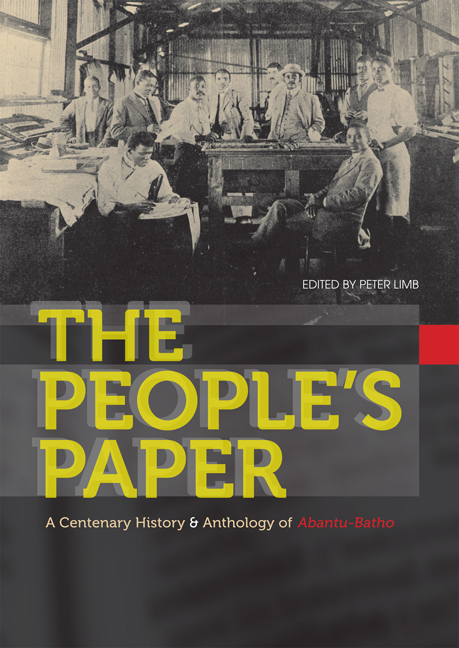Book contents
- Frontmatter
- Contents
- Contributors
- Acknowledgements
- Preface
- List of Abbreviations and Acronyms
- List of Illustrations
- PART I Essays
- Overview
- FOUNDERS AND EDITORS
- THEMES AND CONNECTIONS
- Chapter 6 The Swazi Royalty and the Founding of Abantu-Batho in a Regional Context
- Chapter 7 Abantu-Batho and the Xhosa Poets
- Chapter 8 African Royalty, Popular History and Abantu-Batho
- Chapter 9 ‘Johannesburg in Flames’: The 1918 Shilling Campaign, Abantu-Batho and Early African Nationalism in South Africa
- Chapter 10 Garveyism, Abantu-Batho and the Radicalisation of the African National Congress during the 1920s
- Chapter 11 An African Newspaper in Central Johannesburg: The Journalistic and Associational Context of Abantu-Batho
- Conclusion: Assessing the Decline and Legacy of Abantu-Batho
- PART II Anthology
Chapter 11 - An African Newspaper in Central Johannesburg: The Journalistic and Associational Context of Abantu-Batho
from THEMES AND CONNECTIONS
Published online by Cambridge University Press: 21 April 2018
- Frontmatter
- Contents
- Contributors
- Acknowledgements
- Preface
- List of Abbreviations and Acronyms
- List of Illustrations
- PART I Essays
- Overview
- FOUNDERS AND EDITORS
- THEMES AND CONNECTIONS
- Chapter 6 The Swazi Royalty and the Founding of Abantu-Batho in a Regional Context
- Chapter 7 Abantu-Batho and the Xhosa Poets
- Chapter 8 African Royalty, Popular History and Abantu-Batho
- Chapter 9 ‘Johannesburg in Flames’: The 1918 Shilling Campaign, Abantu-Batho and Early African Nationalism in South Africa
- Chapter 10 Garveyism, Abantu-Batho and the Radicalisation of the African National Congress during the 1920s
- Chapter 11 An African Newspaper in Central Johannesburg: The Journalistic and Associational Context of Abantu-Batho
- Conclusion: Assessing the Decline and Legacy of Abantu-Batho
- PART II Anthology
Summary
In the preceding chapters we examined the content of Abantu-Batho. This chapter situates the paper in its journalistic and associational context: what was it like to be an African newspaper literally on the sidewalks of central Johannesburg; how did it gather and interpret news; how did it survive socially and financially; and what socio-intellectual matrix did it inhabit or even help create?
THE MAKING OF A NEW RADICAL JOURNALISM
The steady growth of the black-owned and edited press from the 1880s (see the Introduction in this volume) laid an important foundation for Abantu-Batho and supplied useful journalistic connections for advice or providing copy, and even models of layout and design to emulate. But the new paper also found its own niche as both a national and Johannesburg forum. It challenged the hegemony of the Establishment press that controlled public knowledge. There had been earlier flashes of radicalism, as in Izwi Labantu, but these faded as fast as the paper. Abantu-Batho sought to be a journal of national politics and quality, as opposed to a tabloid, but with a hybrid character and inclusive of human-interest stories and advertisements (see below). Above all, it was a political newspaper.
In other chapters we investigate themes of political campaigns and policies, resistance, and the initial construction of nationhood in its pages. Here I suggest that Abantu-Batho both reflected and helped create African politics. It was a new media for Africans with a wider national and linguistic reach than before and a strident new assertiveness – the Facebook of the 1910s. Over time, under fire from the Right and with declining resources and a worn-out press, it failed to keep up with technological change. Yet those writers who stayed with Abantu-Batho refused to kowtow to the white-sponsored ‘yellow’ press epitomised by Umteteli wa Bantu, and retained their assertiveness and autonomy – to the extent that a largely pro-Congress editorial team could ever be fully ‘independent’ of politics. In this regard, it was the start of a new radical journalism later consummated in The Guardian and Inkundla ya Bantu.
- Type
- Chapter
- Information
- The People’s PaperA Centenary History & Anthology of Abantu-Batho, pp. 298 - 317Publisher: Wits University PressPrint publication year: 2012



